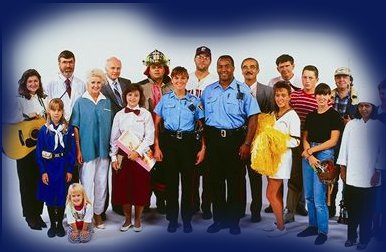|

Audio
Sermon

Deuteronomy
28:1-6 Blessings for obedience
If
you fully obey the Lord your God, and carefully follow
all his commands that I give you today, the Lord your
God will set you high above all the nations on earth.
All these blessings will come upon you and accompany you
if you obey the Lord your God:
You
will be blessed in the city and blessed in the country.
The
fruit of your womb will be blessed, and the crops of
your land, and the young of your livestock--the calves
of your herds and the lambs of your flocks.
Your
basket and your kneading trough will be blessed.
You
will be blessed when you come in and blessed when you go
out.
Luke
10:25-37 The good Samaritan
On
one occasion an expert in the law stood up to test
Jesus. "Teacher," he asked, "what must I
do to inherit eternal life?"
"What
is written in the Law?" he replied. "How do
you read it?"
He
answered: "'Love the Lord your God with all your
heart and with all your soul and with all your strength
and with all your mind'; and, 'Love your neighbor as
yourself.'"
"You
have answered correctly," Jesus replied. "Do
this and you will live."
But
he wanted to justify himself, so he asked Jesus,
"And who is my neighbor?"
In
reply Jesus said: "A man was going down from
Jerusalem to Jericho, when he fell into the hands of
robbers. They stripped him of his clothes, beat him, and
went away, leaving him half dead. A priest happened to
be going down the same road, and when he saw the man, he
passed by on the other side. So too, a Levite, when he
came to the place and saw him, passed by on the other
side. But a Samaritan, as he traveled, came where the
man was; and when he saw him, he took pity on him. He
went to him and bandaged his wounds, pouring on oil and
wine. Then he put the man on his own donkey, brought him
to an inn and took care of him. The next day he took out
two silver coins and gave them to the innkeeper. 'Look
after him,' he said, 'and when I return, I will
reimburse you for any extra expense you may have.'
"Which
of these three do you think was a neighbor to the man
who fell into the hands of robbers?"
The
expert in the law replied, "The one who had mercy
on him."
Jesus
told him, "Go and do likewise."
The
Heavenly City #91 Levels of the neighbor
It
is not just individual people who are our neighbor, but
also groups of people, such as small and large
communities, our country, religion, the Lord's realm,
and most of all, the Lord himself. All of these are our
neighbor, so we should do good things for them out of
love.
These
groups of people are our at higher and higher levels. A
community with many people in it is our neighbor at a
higher level than an individual person; our country is
our neighbor at an even higher level; religion at an
even higher level; the Lord's realm at a still higher
level; and the Lord is our neighbor at the highest level
of all. These higher and higher levels are like a
staircase with the Lord at the top.

 "Which
of these three do you think was a neighbor to the man
who fell into the hands of robbers?" The expert in
the law replied, "The one who had mercy on
him." Jesus told him, "Go and do
likewise." (Luke 10:36-37) "Which
of these three do you think was a neighbor to the man
who fell into the hands of robbers?" The expert in
the law replied, "The one who had mercy on
him." Jesus told him, "Go and do
likewise." (Luke 10:36-37)
It
is good to get back to basics. And for our Sunday School
classes and worship services this fall, we are going to
get back to one of the most basic basics commanded by
the Lord: loving our neighbor. In traditional language,
this is called "charity." But charity means so
much more than donating money to the poor and
volunteering our time to help those in need. It is not
just something we do with our spare money and in our
spare time. Charity is a way of life. Charity is
expressed (or not) in everything we think, feel, say,
and do.
Today,
as an introduction to our fall series, we will take a
brief tour of two of the answers given in our church's
teachings to the question that the lawyer asked Jesus:
"Who is my neighbor?"
One
answer to this question--which a thoughtful reading of
the Parable of the Good Samaritan will reveal, is that
the good in others in our neighbor. Swedenborg writes:
Goodness
is our neighbor in the broadest sense, since people
are our neighbor according to the kind of good
qualities they have from the Lord. And since goodness
is our neighbor, love is our neighbor, because all
goodness comes from love. So people are our neighbor
according to the kind of love they have from the Lord.
(The Heavenly City #88)
The
practical meaning of this is that in loving our
neighbors and doing good for them, we are to help and
strengthen what is good in them, and, on the other hand,
work against and weaken what is not good in them. The
refrain from classic song made popular by Bing Crosby
expresses it well:
You've
got to accentuate the positive,
Eliminate the negative,
Latch on to the affirmative,
Don't mess with Mister In-Between,
You've
got to spread joy up to the maximum,
Bring gloom down to the minimum,
Have faith, or pandemonium's
Liable to walk upon the scene.
If
our words and actions toward others help to accentuate
the best in them and eliminate the worst in them, then
we are truly loving our neighbor.
But
this does not fully answer the question asked by the
lawyer, "Who is my neighbor?" Another
answer--one that will provide the guideline for our fall
series--is provided in our reading from The Heavenly
City, #91, on "levels of the neighbor."
Here is the gist of it:
It
is not just individual people who are our neighbor,
but also groups of people, such as small and large
communities, our country, religion, the Lord's realm,
and most of all, the Lord himself. All of these are
our neighbor, so we should do good things for them out
of love.
Living
as we do in a rather individualistic society, when we
hear the word "neighbor," we tend to think of
individual people.
But
as Swedenborg points out, the word "neighbor"
has broader and broader meanings as we move from
individual human beings to the community, to the
country, and even, these days, to the entire world. And
it  has both broader and deeper meanings as we move on
from civil society to spiritual society: to people's
religious faith, and to the Lord's kingdom throughout
the earth--which we as Swedenborgians believe extends to
people of all faiths who love God and live by the good
teachings of their religion. And of course, God is our
highest neighbor, and God's presence in all people and
in all things is the neighbor in the broadest sense of
all. has both broader and deeper meanings as we move on
from civil society to spiritual society: to people's
religious faith, and to the Lord's kingdom throughout
the earth--which we as Swedenborgians believe extends to
people of all faiths who love God and live by the good
teachings of their religion. And of course, God is our
highest neighbor, and God's presence in all people and
in all things is the neighbor in the broadest sense of
all.
What
does this teaching mean? And what does it do for us?
It
means that if we are loving and serving the people right
around us, that is good--but it is only the beginning of
living a truly charitable life. This teaching calls us
to move beyond the people closest to us, and extend our
love and charity to those more distant from us--to
people we may not know or appreciate at all.
If
we think about it, this idea is contained right in the
parable itself. As has been pointed out many times, the
Samaritans were considered anything but neighbors by the
largely Jewish audience who heard Jesus speak the
parable. The Samaritans were hated and despised
foreigners--people to be scorned, not people to be
loved. And Jesus taught this highly resistant crowd that
even those outcast foreigners can both love and be
loved. The parable pushes the boundaries of our love and
charity beyond our family, our friends, our co-workers,
our customers, to those in other communities and other
nations.
In
today's geopolitical environment, this would mean that
as Americans, Jesus is commanding us to see the good in
the Iraqis, the Iranians, and the North Koreans. Jesus
is commanding us to think of them as our neighbor, and
seek ways to do good for them, just as the Samaritan in
the parable did good for the man who fell into the hands
of robbers. (And his hearers would naturally have
thought of that poor man as a Jew like themselves.)
Both
the Bible and the teachings of our church call us to
broaden our concept of the neighbor, to broaden the
boundaries of our hearts, to these higher levels of the
neighbor.
If
we have learned to love and serve our individual
neighbor, perhaps it is time to start thinking about our
community and its good. Perhaps it is time to put some
of our knowledge and skills to work making our community
a better place to live.
If
we have done this--have gotten involved in our community
and its concerns, and served on that level, then perhaps
it is time to broaden our charitable action still
further, and think of what we can do to serve our nation
and its good. There are many opportunities.
And
if our thinking and our loyalty and service already
extends to our nation, then perhaps it is time to stretch our hearts still further to the church and to
the Lord's kingdom on earth--to people of all faiths
throughout the world--even those whose religion we don't
particularly understand or appreciate. What can we do to
serve those whose beliefs and lives are very different
from our own?
stretch our hearts still further to the church and to
the Lord's kingdom on earth--to people of all faiths
throughout the world--even those whose religion we don't
particularly understand or appreciate. What can we do to
serve those whose beliefs and lives are very different
from our own?
And
of course, the highest meaning of loving our neighbor is
to love the Lord above all, and to seek out and cherish
the Lord's presence everywhere we can find it. This
means looking for the good and the truth in everyone
around us, at all levels. It means bringing out the best
in our own children and grandchildren, and it also means
seeing and bringing out the best in those we may think
of as our enemies around the world.
"Who
is my neighbor?" the lawyer asked. Our neighbor is
everyone and everything throughout the world. Because if
we are willing to open our eyes to greater spiritual
heights, we will find that there is good in every
person, in every nation, and in every religion. Amen.


Audio
Sermon
Music:
Heart to Heart
© 1999 Bruce DeBoer

Color Scroll Bar Scripts Courtesy of:

|